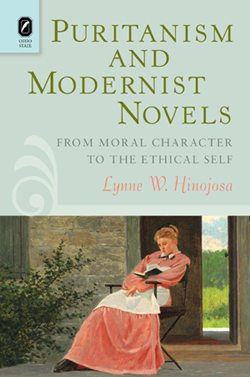Puritanism and Modernist NovelsFrom Moral Character to the Ethical SelfLynne W. HinojosaLiterature, Religion, and Postsecular Studies |
 2/16/2015 LITERARY CRITICISM / European / English, Irish; RELIGION / Christianity / Literature 240 pp. 6x9  $32.95 paper 978-0-8142-5205-5 Add paper to shopping cart Shopping Cart Instructions Review/Change Shopping Cart & Check-out | |||
|
Table of Contents
Explore More |
“To say that Puritanism and Modernist Novels is ambitious is an understatement. I am most impressed by the boldness and richness of Hinojosa’s complex, difficult thesis, which connects the historical emergence of Puritan hermeneutics to theories of the novel and British modernist novels by examining Robinson Crusoe, Dorian Gray, A Room with a View, Portrait of the Artist, and The Good Soldier. This is quite a feat of linkages, made all the more impressive by the fact these are more indirect than directly traceable. Puritanism and Modernist Novels is a strong, significant, and sustained contribution to readings of classic modernist works and to currently developing theories of the novel.” —Michael Ditmore, Pepperdine University “Hinojosa’s argument is convincing and compelling. The writing style is crisp and lucid, clear and linear. The work is effectively organized, amiably conceptualized, and impeccably argued.” —Paul Lim, Vanderbilt UniversityIn Puritanism and Modernist Novels: From Moral Character to the Ethical Self, Lynne W. Hinojosa complicates traditional interpretations of the novel and literary modernism as secular developments of modernity by arguing that the British novel tradition is fundamentally shaped by Puritan hermeneutics and Bible-reading practices. This tradition, however, simultaneously works to dismantle the categories associated with social morality and moral character, helping to form “Puritanism” into a fictional stereotype. Hinojosa demonstrates that the novel thus perpetuates a narrative that associates Puritanism with moral and religious confinement, on the one hand, and modern longing with escape, on the other—even as it remains tied to Puritan views of history and the self. Puritanism and Modernist Novels offers new formal and contextual readings of early modernist novels by Oscar Wilde, E. M. Forster, James Joyce, and Ford Madox Ford. Hinojosa demonstrates that, while they long for escape, these authors still question the value of the novelistic narrative of confinement and escape. Bridging modernist and novel studies, Puritanism and Modernist Novels contributes to conversations about secularization and religion in both fields, highlighting the limitations created by the secularization narrative of modernity.Lynne W. Hinojosa is associate professor of literature in the honors program at Baylor University. | |||

